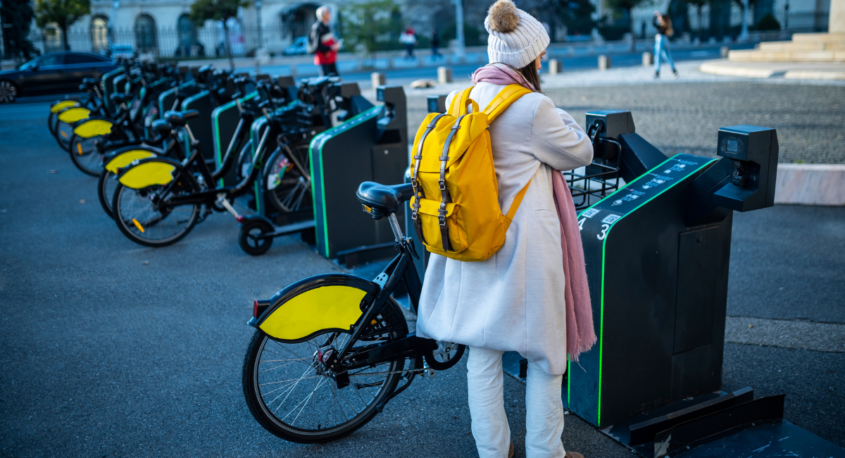Sustainable Travel Tips for Backpackers

Backpacking has witnessed a surge in popularity, and it’s not just about the budget-friendly exploration of diverse cultures and lifestyles; beyond its cost-effectiveness, backpacking presents an excellent opportunity to make a positive and enduring impact on the places you visit and we want to give some sustainable travel tips for backpackers.
Sustainable travel is more than a trend; it’s a conscious choice to explore the world while preserving its beauty and diversity.
What does it mean Travelling with an Attention to a Sustainable Lifestyle?
Traveling with attention to a sustainable lifestyle involves making conscious and responsible choices throughout your journey to minimize your environmental and social impact.
This approach encompasses various aspects of travel and it reflects a commitment to preserving the environment, supporting local communities, and promoting ethical practices.

Exploring the Dimensions of Sustainable Travel
When delving into the realm of sustainable travel, it is crucial to dissect the ramifications of overtourism through the lenses of ecology, economy, and society.
Sustainable travel tips for backpackers – Ecological Impact
The ecological footprint of travel is a pressing concern, prompting a closer examination of the actual environmental toll of our journeys.
The mode of transportation emerges as a significant contributor, with commercial aviation alone responsible for a substantial 2.4% of global carbon emissions in 2020.
Cruise ships, often perceived as idyllic modes of exploration, are estimated to produce three to four times more carbon dioxide per passenger than airplanes.
Beyond the transit itself, the tourism industry’s overall contribution to carbon dioxide emissions, nearly 10%, extends to individual travel habits.
Mundane actions such as leaving lights on, indulging in lengthy showers, or neglecting towel reuse at hotels collectively contribute to emissions, transcending the notion that vacation habits remain divorced from everyday environmental impacts.
Sustainable travel tips for backpackers – Economic Considerations
Tourism serves as a pivotal economic force for many locales, injecting revenue, employment opportunities, and foreign exchange into communities.
Embracing sustainable travel entails a nuanced evaluation of where our financial contributions flow and the nature of employment fostered by the tourism sector.
While approximately 7% of global employment stems from tourism, the industry often grapples with issues of low wages and unfavorable working conditions.
Responsible travel urges us to scrutinize the fairness of employment terms and strive to ensure that a significant portion of our expenditures remains within the host community.
In areas grappling with overtourism, the prevalence of multinational corporations as proprietors of attractions, accommodations, and eateries raises concerns about the equitable distribution of funds to local enterprises.
Sustainable travel tips for backpackers – Social Dynamics
The essence of travel lies in the invaluable exposure to diverse cultures, customs, and ways of life.
As we engage with unfamiliar societies, savor exotic cuisines, and become part of new environments, it becomes imperative to gauge the impact of our presence on local communities.
In the context of socially sustainable travel, preserving the authenticity of a culture and preventing undue burdens on the host community becomes paramount.
The goal is to ensure that our interactions contribute positively to the cultural fabric rather than diluting its essence.
This involves a conscientious approach to travel, where sensitivity to local norms and a commitment to minimizing any adverse effects on the communities we visit are integral components of a sustainable journey.
If you’re a backpacker eager to make a positive impact on the environment, here are some sustainable travel tips to consider.
Cultivating Eco-Friendly Habits in Accommodation
When planning your backpacking journey, prioritize eco-friendly accommodation options.
Many hotels and lodges are embracing sustainable practices, such as utilizing solar energy and minimizing energy consumption.
Opting for such establishments allows you to amplify your positive environmental impact.
Supporting local businesses is another key strategy for sustainable travel, contributing to both the environment and the local economy.
Embrace Reusable Essentials
Carrying reusable items like water bottles and utensils is a cornerstone of sustainable travel.
A reusable water bottle not only reduces reliance on single-use plastic but also enables you to sample street food without generating unnecessary waste.
Consider investing in reusable utensils and stencils to further minimize your environmental footprint while on the go.
Prioritize Public Transport
When moving between locations, explore the use of public transportation, such as trains or ferries.
This not only aligns with sustainable travel but also offers an immersive experience in the local culture.
In areas where public transport might be limited, explore carpooling options through reliable websites, allowing you to share rides with fellow travelers and reduce costs.
Opt for Eco-Friendly Supplies
Give careful thought to the toiletries and supplies you carry. Opt for eco-friendly alternatives such as solid soap bars and biodegradable wipes to minimize plastic waste.
These choices contribute significantly to reducing your environmental impact during your travels.
Mindful Waste Management
Managing waste responsibly is crucial during a backpacking trip. Carry a small trash bag to dispose of waste regularly and ensure it reaches designated waste bins.
Adhere to local regulations for recycling, and if bins are not readily available, carry your waste until a suitable disposal solution is found.
Support Local Products and Businesses
Being an eco-friendly backpacker involves supporting local businesses and buying locally produced goods.
This not only minimizes transport emissions but also fosters sustainable tourism, allowing you to immerse yourself in the local culture and gain insights into the community’s way of life.

Minimize Air Travel
Reducing air travel is a key strategy for environmentally conscious backpackers. Flights contribute significantly to greenhouse gas emissions, and minimizing air travel helps alleviate the environmental burden.
Explore alternative routes, prioritize direct flights, and consider overland travel for shorter distances. Opting for economy class further reduces your carbon footprint compared to business class.
Travel at a Slower Pace
Traveling slowly, spending more time in one location, enhances your connection with the destination and its people.
This approach fosters a deeper understanding of local culture, allows for meaningful interactions, and benefits the entire community.
Additionally, traveling overland less frequently contributes to reduced emissions.
Water Filtration for Safe Hydration
In regions where accessing safe drinking water is challenging, consider carrying a water filtration system.
This ensures you can filter water as needed, reducing the need for single-use plastic bottles and minimizing waste.
Support Sustainable Tour Operators
Choose tour operators committed to sustainable practices and minimizing environmental impact.
Research their eco-friendly initiatives before booking, supporting those who align with your values.
Opt for local restaurants over chains and consider hiring a local guide upon arrival to minimize additional travel.
By incorporating these sustainable travel tips for backpackers into your backpacking adventure, you can make a positive impact on the environment and communities you encounter, creating a more enriching and responsible travel experience.



